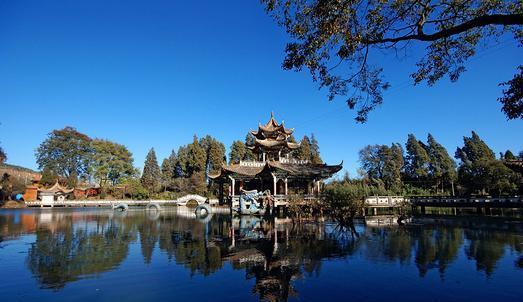Xipu Park in Chengjiang County, Yuxi
Chinese Name: 澄江县西浦公园
English Name: Xipu Park in Chengjiang County, Yuxi
Climate Conditions: Subtropical Monsoon Climate
Opening Hours: Year-round: Monday to Sunday 07:30 – 18:30
Location and Natural Environment
Location
Located 4 kilometers northwest of Chengjiang County in Yunnan Province, next to Luobu Village in Longjie Town, at the foot of Liangwang Mountain.

Natural Scenery
Xilongtan is situated in the foothill area below the karst mountain range, with the back of Pandlonggang Mountain comprising karst formations. At the foot of the mountain, spring water emerges from lava caves, with a flow rate of about 0.4 cubic meters per second, forming a pool. The depth of the pool is approximately 1.5-2 meters, covering an area of about 22 square meters.
Vegetation and Ecology
The surrounding area is densely forested with ancient trees, and the mountains are rich in trees, flowers, and grasses, including over a hundred fragrant ancient trees. The water in the pool near the spring water outlet is clear and transparent.
Parks and Cultural Facilities
Architecture
Xilongtan Park features a single-arch flat bridge approximately 12 meters long and 4.5 meters high. Ancient buildings from the Ming and Qing dynasties, such as Longgang Temple, Longquan Temple, the opera stage, Guanyin Temple, and Jianfeng Pavilion, are located here.
Other Facilities
The park includes a martyr’s cemetery, and on the surface of the large pool, there are wooden pavilions and a winding corridor over the water. A newly built giant blue dragon approximately 30 meters long in the water is a prominent attraction.
Restoration and Protection
In 1980, Xilongtan was listed as one of the county’s key protected scenic spots. The government allocated funds for planning and renovation, restoring pavilions, temples, and constructing new attractions like the giant water dragon.
Seasonal Changes and Characteristics
Summer
The spring water emerging from the foot of the cliff is clean, and the pool water is gentle. During the rainy season, the spring water may appear slightly murky, but it creates a clear distinction between the clear and murky water in the pool.
Autumn and Winter
The pool water becomes even clearer, occasionally with fallen leaves floating on the surface.
Culture and Festivals
Festivals
Every year during the beginning of summer, the people of Chengjiang celebrate the “Beginning of Summer Festival” or “Xipu Festival” at Xilongtan. Traditional activities include performing plays for the gods, worshiping the Dragon King, and praying for favorable weather and abundant harvests.
Historical Background of the Festival
According to a tablet inscription from the 27th year of the Qianlong reign during the Qing Dynasty (1755), villagers take turns performing plays by the pool during the Beginning of Summer Festival and the Dragon King’s birthday. The late Qing writer He Zongzhang’s “Phantom Talks” also mentions that there are dramatic performances and celebrations at Xilongtan every year during the Beginning of Summer.
Festival Activities
During the festival, residents from Chengjiang and surrounding areas, including Han Chinese and ethnic minorities, come to Xilongtan to celebrate. Elders select young people to hold placards proclaiming “favorable weather and abundant harvests” for worship. The performances then continue for three days and nights. Officials and the public also enjoy festivities at the entrance of the Dragon King Temple opposite the opera stage. Temporary pavilions and stalls are set up along the roadside at the foot of the mountain, selling local products, goods, and snacks, creating a lively atmosphere.
Commentary Text
In 1942, Zhou Yeqiao inscribed writings on a single-arch stone bridge between Yueya Pond and Datang, describing the natural scenery of Xilongtan and the characteristics of its clear and murky water, referring to it as “mysterious and wonderful, a naturally beautiful place.”
Due to its clear spring water and beautiful scenery, Xilongtan has been referred to by literati as “Long (Stone) Lingqiao” and has been one of the famous scenic spots in Chengjiang County since ancient times, honored as one of the “Ten Scenic Spots of Chengjiang.”
















